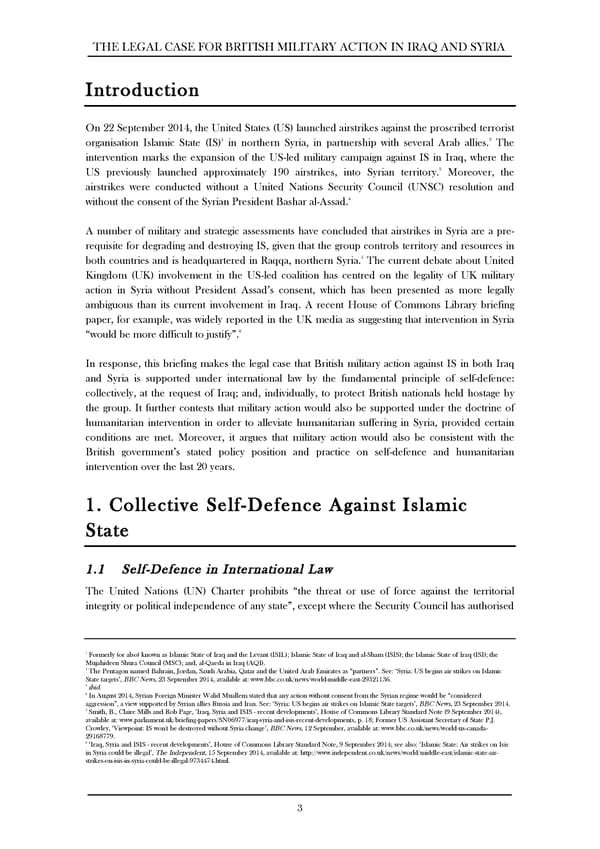THE LEGAL CASE FOR BRITISH MILITARY ACTION IN IRAQ AND SYRIA Introduction On 22 September 2014, the United States (US) launched airstrikes against the proscribed terrorist 1 2 organisation Islamic State (IS) in northern Syria, in partnership with several Arab allies. The intervention marks the expansion of the US-led military campaign against IS in Iraq, where the 3 US previously launched approximately 190 airstrikes, into Syrian territory. Moreover, the airstrikes were conducted without a United Nations Security Council (UNSC) resolution and 4 without the consent of the Syrian President Bashar al-Assad. A number of military and strategic assessments have concluded that airstrikes in Syria are a pre- requisite for degrading and destroying IS, given that the group controls territory and resources in both countries and is headquartered in Raqqa, northern Syria.5 The current debate about United Kingdom (UK) involvement in the US-led coalition has centred on the legality of UK military action in Syria without President Assad’s consent, which has been presented as more legally ambiguous than its current involvement in Iraq. A recent House of Commons Library briefing paper, for example, was widely reported in the UK media as suggesting that intervention in Syria 6 “would be more difficult to justify”. In response, this briefing makes the legal case that British military action against IS in both Iraq and Syria is supported under international law by the fundamental principle of self-defence: collectively, at the request of Iraq; and, individually, to protect British nationals held hostage by the group. It further contests that military action would also be supported under the doctrine of humanitarian intervention in order to alleviate humanitarian suffering in Syria, provided certain conditions are met. Moreover, it argues that military action would also be consistent with the British government’s stated policy position and practice on self-defence and humanitarian intervention over the last 20 years. 1. Collective Self-Defence Against Islamic State 1.1 Self-Defence in International Law The United Nations (UN) Charter prohibits “the threat or use of force against the territorial integrity or political independence of any state”, except where the Security Council has authorised 1 Formerly (or also) known as Islamic State of Iraq and the Levant (ISIL); Islamic State of Iraq and al-Sham (ISIS); the Islamic State of Iraq (ISI); the Mujahideen Shura Council (MSC); and, al-Qaeda in Iraq (AQI). 2 The Pentagon named Bahrain, Jordan, Saudi Arabia, Qatar and the United Arab Emirates as “partners”. See: ‘Syria: US begins air strikes on Islamic State targets’, BBC News, 23 September 2014, available at: www.bbc.co.uk/news/world-middle-east-29321136. 3 ibid. 4 In August 2014, Syrian Foreign Minister Walid Muallem stated that any action without consent from the Syrian regime would be “considered aggression”, a view supported by Syrian allies Russia and Iran. See: ‘Syria: US begins air strikes on Islamic State targets’, BBC News, 23 September 2014. 5 Smith, B., Claire Mills and Rob Page, ‘Iraq, Syria and ISIS - recent developments’, House of Commons Library Standard Note (9 September 2014), available at: www.parliament.uk/briefing-papers/SN06977/iraq-syria-and-isis-recent-developments, p. 18; Former US Assistant Secretary of State P.J. Crowley, ‘Viewpoint: IS won't be destroyed without Syria change’, BBC News, 12 September, available at: www.bbc.co.uk/news/world-us-canada- 29168779. 6 ‘Iraq, Syria and ISIS - recent developments’, House of Commons Library Standard Note, 9 September 2014; see also: ‘Islamic State: Air strikes on Isis in Syria could be illegal’, The Independent, 15 September 2014, available at: http://www.independent.co.uk/news/world/middle-east/islamic-state-air- strikes-on-isis-in-syria-could-be-illegal-9734474.html. 3
 The legal case for action Page 2 Page 4
The legal case for action Page 2 Page 4